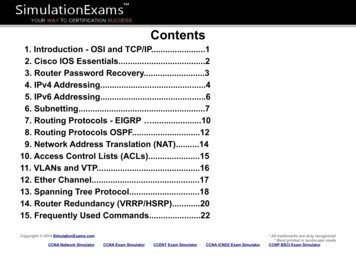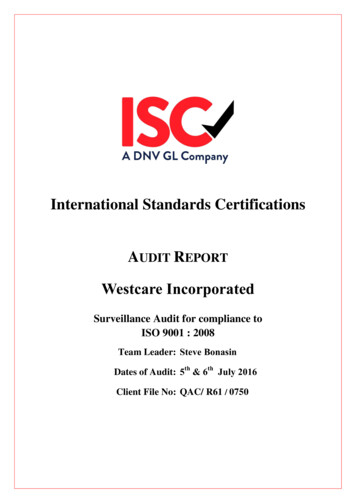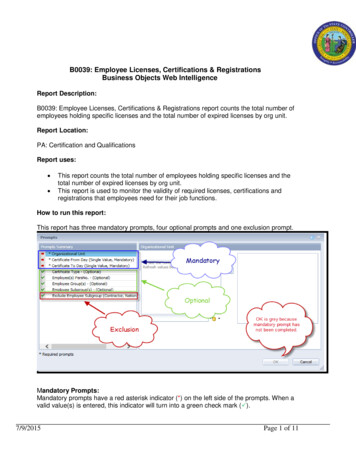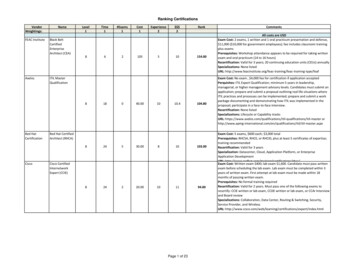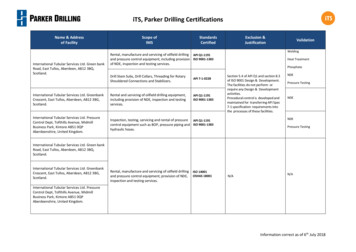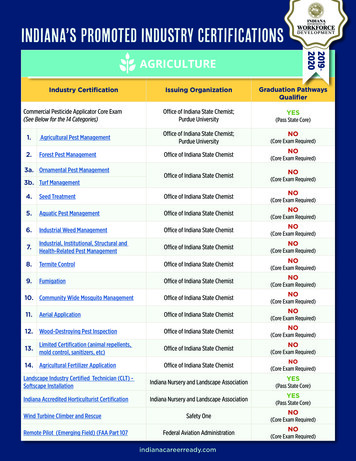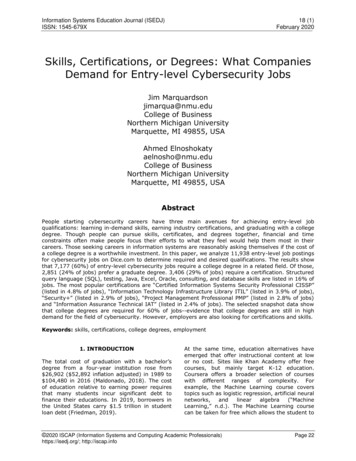
Transcription
Information Systems Education Journal (ISEDJ)ISSN: 1545-679X18 (1)February 2020Skills, Certifications, or Degrees: What CompaniesDemand for Entry-level Cybersecurity JobsJim Marquardsonjimarqua@nmu.eduCollege of BusinessNorthern Michigan UniversityMarquette, MI 49855, USAAhmed Elnoshokatyaelnosho@nmu.eduCollege of BusinessNorthern Michigan UniversityMarquette, MI 49855, USAAbstractPeople starting cybersecurity careers have three main avenues for achieving entry-level jobqualifications: learning in-demand skills, earning industry certifications, and graduating with a collegedegree. Though people can pursue skills, certificates, and degrees together, financial and timeconstraints often make people focus their efforts to what they feel would help them most in theircareers. Those seeking careers in information systems are reasonably asking themselves if the cost ofa college degree is a worthwhile investment. In this paper, we analyze 11,938 entry-level job postingsfor cybersecurity jobs on Dice.com to determine required and desired qualifications. The results showthat 7,177 (60%) of entry-level cybersecurity jobs require a college degree in a related field. Of those,2,851 (24% of jobs) prefer a graduate degree. 3,406 (29% of jobs) require a certification. Structuredquery language (SQL), testing, Java, Excel, Oracle, consulting, and database skills are listed in 16% ofjobs. The most popular certifications are “Certified Information Systems Security Professional CISSP”(listed in 4.8% of jobs), “Information Technology Infrastructure Library ITIL” (listed in 3.9% of jobs),“Security ” (listed in 2.9% of jobs), “Project Management Professional PMP” (listed in 2.8% of jobs)and “Information Assurance Technical IAT” (listed in 2.4% of jobs). The selected snapshot data showthat college degrees are required for 60% of jobs--evidence that college degrees are still in highdemand for the field of cybersecurity. However, employers are also looking for certifications and skills.Keywords: skills, certifications, college degrees, employment1. INTRODUCTIONThe total cost of graduation with a bachelor’sdegree from a four-year institution rose from 26,902 ( 52,892 inflation adjusted) in 1989 to 104,480 in 2016 (Maldonado, 2018). The costof education relative to earning power requiresthat many students incur significant debt tofinance their educations. In 2019, borrowers inthe United States carry 1.5 trillion in studentloan debt (Friedman, 2019).At the same time, education alternatives haveemerged that offer instructional content at lowor no cost. Sites like Khan Academy offer freecourses, but mainly target K-12 education.Coursera offers a broader selection of courseswith different ranges of complexity. Forexample, the Machine Learning course coverstopics such as logistic regression, artificial ,” n.d.). The Machine Learning coursecan be taken for free which allows the student to 2020 ISCAP (Information Systems and Computing Academic Professionals)https://isedj.org/; http://iscap.infoPage 22
Information Systems Education Journal (ISEDJ)ISSN: 1545-679Xaccess all content except graded assignments,or a 79 fee can be paid which unlocks gradedassignments and provides the option to earn acertificate. These massively scalable learningoptions are constantly adding new courses.Basically, as a potential alternative to the collegedegree, students can find cheap or freeresources to learn skills that are sought inindustry. A motivated student can learn onlinemuch of what is taught in a college classroom.But the same can be said of public librarieswhich have also failed to put universities out ofbusiness. The university seems to still add valuebeyond the mere collection and dissemination ofideas and information.Society has traditionally placed value in collegedegrees beyond the immediate impact to thestudent on employment prospects. A major goalof universities is to educate a populace that canresponsibly participate in the communitydiscourse, produce leaders, and choose politicalrepresentation. These high-minded goals insome way contrast the guidance of recentdecades that told students they need a collegedegree so that they can land a good job andmake good money. The Great Recession of thelate 2000s and early 2010s found some collegegraduates unemployed or underemployed (Abel,Deitz, & Su, 2014), souring many graduates’opinions on the value of a college degree.The remainder of this paper will shelve thebenefits of a university education for society andfor individual growth. Instead, the paper willaddress how skills, certificates, and degrees helppeople start their careers in informationsystems. Following is a literature review thatcompares skills, certificates and degrees. Then,an analysis of job postings is given to determinewhat the market demands.2. LITERATURE REVIEWIn this section we describe how skills,certificates, and degrees help people advancetheir careers.SkillsHistorically, companies in need of highly skilledlabor have demanded college degrees. Recently,companies like Google, Apple, and Oracle havedropped the college degree requirement, insteadchoosing to emphasize work experience andspecific skills (Hill, 2019). Skills are the degreeto which employees can perform defined tasks.Employees might have skills in a particularprogramming language, a database platform, oranother knowledge domain.18 (1)February 2020Skills definitely matter, but a narrow focus onspecific skills tends to de-emphasize the needfor employees to have well-rounded abilities.Some argue that “the skill-based approach isthus insufficient to identify the competence thatwill enable [an IT] manager to identify new ITopportunities and behave proactively in regardto IT” (Bassellier, Reich, & Benbasat, 2001, p.163). Another fear is that as soon as the skill forwhich an employee was hired is no longerrelevant,theemployermayterminateemployment rather than cross-train. Employersare increasingly reticent to invest in training thecurrent workforce (Cappelli, 2014).The field of information systems is vast, andskills can be developed in an ever-increasingarray of topics. In a survey targeting the 20072008 hiring period for information systems jobs,fundamental accounting, finance, and marketingskills were expected, along with communicationskills and information systems-specific skillssuch as software development, the tation,andproblemidentification(Janicki, Lenox, Logan, & Woratschek, 2008). Ananalysis of job postings in 2017 that required aninformationsystemsdegreefoundthatemployers want skills such as teamwork,programming, written and oral communication,networking, database, systems analysis anddesign, and business (Burns, Gao, Sherman, &Klein, 2018). The results, though a decadeapart, are largely consistent in their findings.Certificates and CertificationCertification can be described as either vendorneutral or vendor-specific (Randall & Zirkle,2005). Certificates like the CompTIA Security assess competence in a fairly broad body ofknowledge that does not focus on any onevendor or technology. The Security certificateis gained by taking a multiple-choice exam. TheCisco Certified Network Administrator (CCNA)certification tests networking knowledge andskills with an emphasis on Cisco’s hardware andsoftware. Though some knowledge transferenceto different domains is expected, additionalstudy would be needed to perform well on othervendor platforms.Some certifications target a single technology,knowledge domain, or course. Microsoft offerscertification for its Office products. Amazonoffers an AWS Certified Alexa Skills Builder examthat “validates a candidate’s ability to build, test,and publish Amazon Alexa skills” (“AWS CertifiedAlexa Skill Builder - Specialty,” n.d., para. 1).The skills proven by these certifications are less 2020 ISCAP (Information Systems and Computing Academic Professionals)https://isedj.org/; http://iscap.infoPage 23
Information Systems Education Journal (ISEDJ)ISSN: 1545-679Xlikely to transfer to technologyinformation systems domains.inotherMany information technology certifications donot require college degrees, unlike otherdisciplines such as accounting and engineering(McKenzie, 2006). Some certifications, however,require work experience in a specific domain.For example, to become a Certified InformationSystems Security Professional (CISSP), acandidate must have five years of workexperience in information security positions(“CISSP Experience Requirements,” n.d.).Thereissomeconcernthatcommoncertifications fail to make job-seekers stand outbecause the number of people certified is sohigh (Gomillion, 2017). However, commoncertifications might indicate achievement of anin-demand skill. Certification in Microsoft Excelmight be common, but many employers seekthese skills (Formby, Medlin, & Ellington, 2017).In an environment when technology changesrapidly, it is understandable why some mightargue for achieving certification in areas thatindustry currently needs. The 2017 job surveymentioned previously showed that 20% of jobsrequired or preferred certification (Burns et al.,2018). Certification appears to be increasinglyimportant, but college degrees continue todemonstrate value empirically as described inthe next section.DegreesCollege degree earners have increased lifetimeearnings of a million dollars over their nondegree earning counterparts (Caruth, 2014). Thetime it takes a student to graduate has a largeimpact on the net present value of an education,largely due to delayed earnings (Lobo & BurkeSmalley, 2018). The desire to earn money rightaway is one reason why some choose to foregocollege, but the data suggests this is a losingstrategy for maximizing lifetime earnings. In asurvey of adults without degrees, the majoritysaid that the expense of going back to get adegree was necessary to get ahead in theircareers (Silliman & Schleifer, 2018).18 (1)February 2020frequently have one or more degrees. Joblistings for cybersecurity architects list agraduate degree in 27% of postings, abachelor’s degree in 69% of postings, and only4% with less than a bachelor’s degree(“Cybersecurity Career Pathway,” n.d.). It isdifficult to predict if the increased focus on skillsis a reaction to immediate skills shortages, or ifit indicates a long-term trend.Data suggests that a college degree can onlyhelp (and not hinder) long-term careerobjectives. Sadly, some students have embracedthe cliché that “C’s get degrees” and think thatby merely graduating they will be granted ahigh-paying job in a rewarding career. Thisshort-sighted view leads some to wonder whythey fail to succeed in the job search.CombinationsA student can learn skills without ever obtaininga certificate or degree. While some employerscare only about what employees can do,certificates and degrees are commonly used tofilter applicants. Earning a certificate or degree(hopefully) proves that a student has learnedskills. Some universities have embeddedindustry certification in degree programs (e.g.,Haga, Moreno, & Segall, 2012; Jovanovic,Bentley, Stein, & Nikakis, 2006). It can bechallenging to find textbooks that fully , 2005). A student can earn acertificate without a degree and vice versa.Certifications and degrees “both have value forjob seekers and the best solution seems to besome combination of both education andcertification” (Gomillion, 2017, p. 72).The focus of study is as important as thedecision to obtain a college degree. Vocationaltraining in technical fields can improve earningpower more than Bachelor of Arts degrees inliberal arts and humanities (Kim & Tamborini,2019).Proving Value to Prospective EmployersJob-seekers must signal their qualifications toemployers (Spence, 1973). College degrees andcertifications are two objective ways to signalqualifications. Accreditation bodies ensure thatuniversities follow best practices and providesome assurance of the value of a degree.Certification centers must also follow strictpractices to ensure that certification exams areaccurate assessments of candidate skills in partby proctoring exams and requiring photoidentification. Skills-based assessments (such ascoding interviews) can be used to validate theskills that should be evident by degrees orcertificates, or when a candidate lacks anycredentials.Despite current trends that emphasize hiringpeople for skills, people in advanced positionsIn the next section, we seek to measure thebenefit of skills, certifications and degrees by 2020 ISCAP (Information Systems and Computing Academic Professionals)https://isedj.org/; http://iscap.infoPage 24
Information Systems Education Journal (ISEDJ)ISSN: ty18 (1)February 2020job3. METHODOLOGYWe created a crawler to collect data of entrylevel cybersecurity professional jobs fromDice.com which is a popular website for IT jobs.The web crawler searched cybersecurity jobs atDice.com based on commonly used words forentry-level cybersecurity jobs like "CybersecurityAnalyst" or "Cybersecurity Architect." Thecrawler collected the 11,938 jobs that wereavailable on Dice.com on June 10, 2019. Wecollected labeled information for each job postlike title, keywords (tags such as analysis,firewall, python, security, and TCP/IP), joblocation, and the job description.The following preprocessing steps were appliedto prepare the data set for analysis. First, allwhitespace (such as new lines and extraspaces), punctuation, and HTML tags wereremoved. Second, the text was converted tolower case and stop words were removed. Stopwords are basically a set of commonly usedwords in any language like “the,” “into,” “just,”and “keep.” By removing the words that arevery commonly used in each language, we couldfocus only on the important words instead, andimprove the accuracy of the text processing.Next, we applied lemmatization for all words toreduce inflectional word forms to linguisticallyvalid lemmas.To extract undergraduate or graduate degreerequirements we searched for keywords like“bachelor degree,” “master degree,” “bsc,”“msc,” “mba,” “doctorate,” and “phd.” To extractprofessional certification requirements, welooked up unigram, bi-grams, tri-grams, fourgrams, five-grams, and six-grams in thesentence where the keywords “certified,”“certification,” or “certificate” was listed and gotthe highest frequency of term occurrence todetect the certifications with the highest demandin the job market like “Information dInformation Security Manager CISM,” nalCISSP.”Toassessskillrequirements, we looked for unigram, bi-grams,tri-grams, four-grams, five-grams, and sixgrams in the sentence in job keywords and jobdescription and got the highest frequency ofterm occurrence to detect the skills with thehighest demand in the job market like“Structured Query Language SQL,” “Testing,”and “SAP.”4. RESULTSThe results show that 60% of entry-levelCybersecurity jobs (7,177 jobs) require a collegedegree in a related field. 24% of jobs (2,851jobs) prefer a graduate degree. 29% of jobs(3,406 jobs) prefer or require certifications.6.6% of jobs preferred certifications withoutspecifying certification names. Other jobs listedspecific certifications as required or preferred.The most popular certifications are “CertifiedInformation Systems Security ProfessionalCISSP” (listed in 4.8% of jobs), “InformationTechnology Infrastructure Library ITIL” (listed in3.9% of jobs), “Security ” (listed in 2.9% ofjobs), “Project Management Professional PMP”(listed in 2.8% of jobs), and “InformationAssurance Technical IAT” (listed in 2.4% ofjobs).Job Posting ElementPostingsCollege degree required60%Graduate degree preferred24%Prefer or require certification29%Table 1: Degrees and Certifications inEntry-level Cybersecurity Job PostingsCertificationPostingsCertified Information Systems4.8%Security Professional (CISSP)Information Technology3.9%Infrastructure Library (ITIL)Security 2.9%Project Management Professional2.8%(PMP)Information Assurance Technical2.4%(IAT)Certified Information Security1.4%Manager (CISM)Cisco Certified Network Associate1.4%(CCNA)Certified Information Systems1.4%Auditor (CISA)Table 2: Most Frequent CertificationsRequested in Entry-level Cybersecurity JobPostings“Certified Information Security Manager CISM,”“Cisco Certified Network Associate CCNA,” and“Certified Information Systems Auditor CISA”are each listed in 1.4% of jobs. “GlobalInformation Assurance GIAC” is listed in 1% ofjobs. “CISCO Certified Network ProfessionalCCNP,” “GIAC Certified Incident Handler GCIH,”and “CompTIA Advanced Security PractitionerCASP” certifications are each listed in less than1% of jobs. The listed certifications are either 2020 ISCAP (Information Systems and Computing Academic Professionals)https://isedj.org/; http://iscap.infoPage 25
Information Systems Education Journal (ISEDJ)ISSN: 1545-679Xrelated to computer networks and security like“CISSP” and “Security ” or more businessoriented like “PMP” and “ITIL”.As for the required or desired skills andqualifications, “Structured Query Language SQL”is listed in 6.3% of jobs, “testing” is listed in5.4% of jobs. “Excel,” “Java,, “Oracle,”“consulting,” “database,” and “hardware” areeach listed in 2-2.6% of jobs. “JavaScript”,“python,” “SAP,” and “Linux” are each listed in1.5-1.6% of jobs.18 (1)February 2020There is a high demand for college degree injobs at all states, and on average 60% of thejobs requested or required a college degree.Figure 2 shows the states with the highestpercentage of jobs requesting college degreerequirements.There is a demand for certifications in all statesand on average 26% of the jobs requested orrequired a certification. Figure 3 shows thestates with the highest percentage of jobsrequesting certifications.We studied the geographic location of thecybersecurity jobs and the majority of jobs areoffered in the west and east coasts as well asTexas and some southern and Midwest states asshown in figure 1. In figure 1, we filtered outstates with less than 100 jobs.Figure 3. States with the HighestPercentage of Jobs Requesting Certification5. DISCUSSIONFigure 1. States with High Supply of Entrylevel Cybersecurity JobsWe analyzed the requested or required criteriaof having a bachelor degree or certifications ineach state with a high supply of cybersecurityjobs. We studied the percentage of cybersecurityjobs that requested or required a bachelordegree or certification to the total jobs per stateas shown in Figure 2 and Figure 3 respectively.Figure 2. States with the HighestPercentage of Jobs Requiring a BachelorDegreeMore than half the entry-level cybersecurity jobsrequire job seekers to have a bachelor degree.Even in entry-level cybersecurity jobs, one inevery four job postings has a graduate degreeas a preference. Often, employers list jobs ion requirements are less frequent thancollege degree requirements. Our results showfewer requirements for college degrees thanother sources. For example, the websiteCyberseek.org reports high levels of a bachelordegree or higher requirement for entry-levelcybersecurity jobs such as technicians andspecialists (85%), analyst and investigators(93%), incident responder and analysts (94%),and IT auditors (98%) (“Cybersecurity CareerPathway,” n.d.). The difference between ourresults may be in the distinction between what ispreferred versus required.Also, certification requirements include bothbusiness and technical certifications. Thecollected job posts show high demand ogy Infrastructure Library ITIL” and“Project Management Professional PMP” as well 2020 ISCAP (Information Systems and Computing Academic Professionals)https://isedj.org/; http://iscap.infoPage 26 pa
a college degree is a worthwhile investment. In this paper, we analyze 11,938 entry-level job postings for cybersecurity jobs on Dice.com to determine required and desired qualifications. The results show that 7,177 (60%) of entry-level cybersecurity jo
